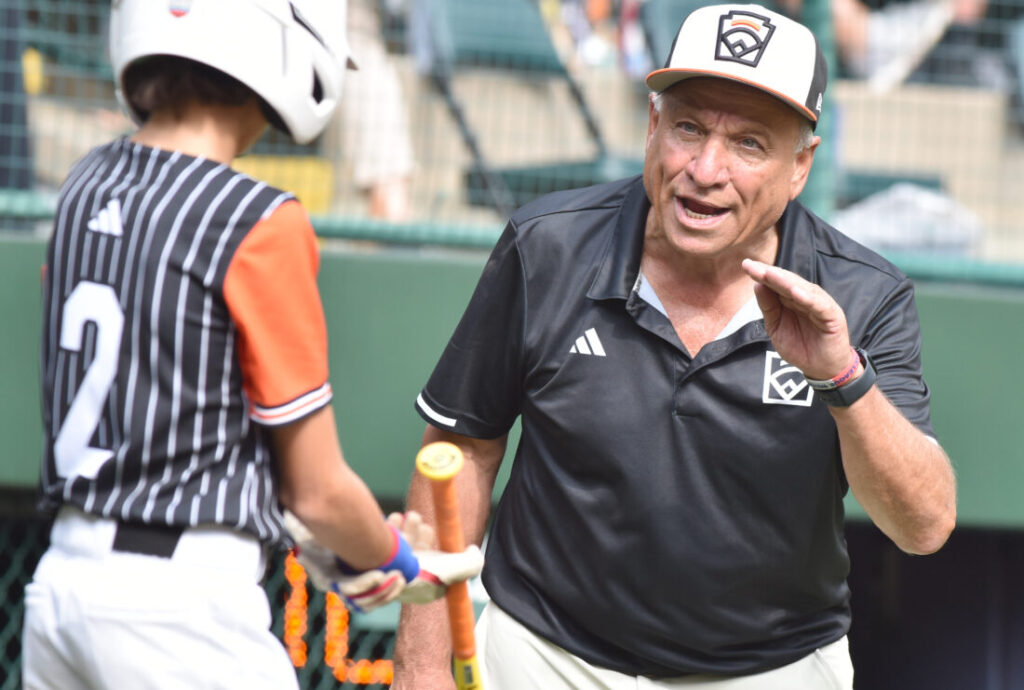
Yankees’ Aaron Judge Catches Heat from Little League Manager: ‘How About Turning Around or Waving?’
In what was meant to be a day of celebration and connection between Major League Baseball and its younger enthusiasts, a minor controversy has surfaced involving Yankees star Aaron Judge and a Little League manager. The New York Yankees’ recent participation in the Little League Classic took a surprising turn when South Shore Little League manager Bob Laterza criticized Judge for allegedly ignoring the young players who had come to see him.
A Missed Opportunity Amidst the Excitement
The Little League Classic, held this past Sunday, was designed to foster interaction between MLB players and the next generation of baseball talent. The Yankees faced off against the Detroit Tigers, and while the game ended with the Yankees losing a 3–2 lead, the focus of the day was supposed to be on the interactions between the pros and the aspiring young athletes.
Aaron Judge, the Yankees’ star slugger and one of the most recognizable figures in baseball, was naturally the center of attention. His towering presence and impressive credentials make him a hero to many young fans. Judge made a concerted effort to engage with as many of these young players as possible, but not everyone was satisfied with his efforts.
The Criticism: A Case of Miscommunication?
According to reports from Silive.com, Laterza, who manages the South Shore Little League team, was disappointed by Judge’s apparent lack of acknowledgment toward his team. Laterza’s comments came after Judge was seen just a short distance away from the kids, who were enthusiastically calling his name.
“Why not turn around or give a wave to New York and the kids who look up to you?” Laterza remarked. “They’re the ones who contribute to your salary.”
Laterza’s remarks highlight a perceived disconnect between Judge’s high-profile status and his interactions with the younger fans. While Judge was reportedly within 10–20 feet of the kids, his failure to make direct contact with them was noted by Laterza, who expressed that the young players were left feeling disappointed.

Judge’s Busy Day: A Missed Opportunity?
Aaron Judge’s schedule during such events is often packed, and his responsibilities can sometimes limit his interactions. At Yankee Stadium, Judge is accustomed to a constant flow of fan interactions, which may make the expectations of Little League fans seem less urgent in the grand scheme of his commitments. Despite several other Yankees players and manager Aaron Boone later reaching out to the team, Judge himself was absent from these interactions.
Laterza expressed hope that Judge might make amends by visiting the team in the future, suggesting that the situation could be an opportunity for Judge to show his dedication to his younger fans.
The Bigger Picture: A Teachable Moment
While the incident has added a layer of drama to an otherwise positive event, it also underscores the challenges and expectations that come with being a high-profile athlete. The Little League Classic was intended to be a platform for building bridges between MLB stars and young fans, but this episode serves as a reminder that even well-intentioned gestures can sometimes miss the mark.
For many, Laterza’s comments add a touch of humor and drama to the story, reminiscent of the classic underdog tales in sports. The Little League manager’s candid critique, though sharp, reflects the passion and high expectations that come with youth sports and fan interactions.
A Mixed Legacy of the Day
In the end, the Little League Classic was a celebration of baseball’s future and an opportunity for young players to engage with their heroes. Despite the criticism aimed at Judge, the event succeeded in bringing attention to the joy and excitement of baseball for kids.
As the dust settles, both Judge and Laterza’s perspectives offer valuable insights into the dynamics of athlete-fan interactions and the high standards set for public figures. While Judge’s absence from a few interactions may have been a minor hiccup, the event as a whole remains a testament to the enduring appeal of baseball and the importance of nurturing the next generation of players.






